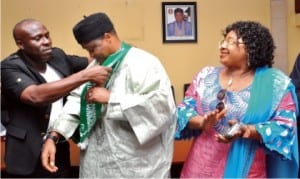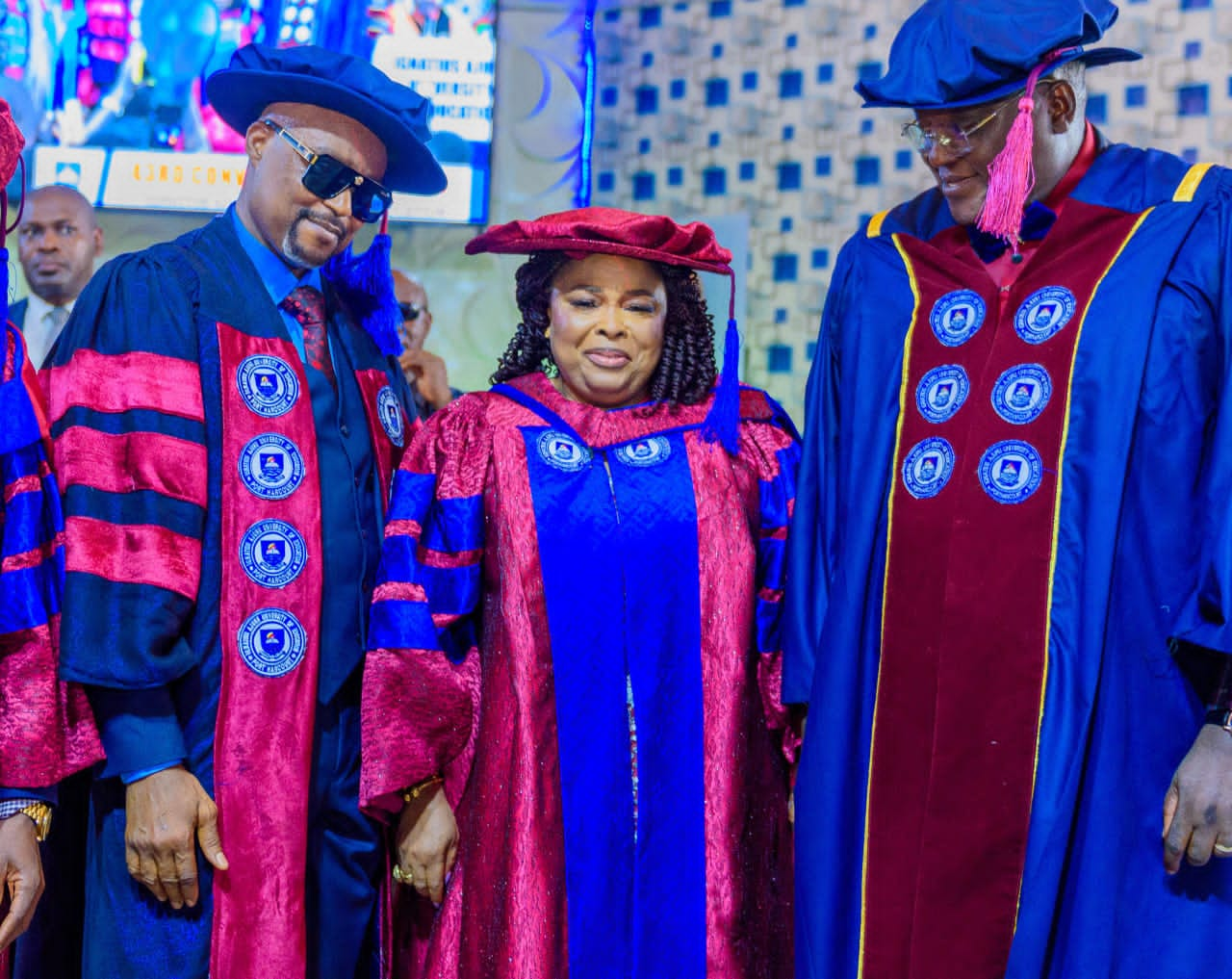Education
Statutory Constraints, Discrimination, Bane Of Polytechnics –Don

Exective Director, Centre for Ethics and Self Value Orientation, Universal Basic Education (ubec), Mr Salih Yakubu (left), presenting a gold medal award to Executive Secretary of ubec, Dr Dikko Sueiman, during presentation of national certificate of credence and gold medal awards, in Abuja. With him is the Director, Quality Assurance, ubec, Dr Chukwuma Agomoh.
A Polytechnic Don, Dr
Obasi, O.Oko, has among others identified constraints emenating from the statute setting up polytechnics and discrimination as key challenges facing polytechnic education in Nigeria.
Dr Obasi, who stated this at a conference on polytechnic education organised by the Rivers State College of Arts and Science (RIVCAS) Chapter of Academic Staff Union of Polytechnics (ASUP), last Thursday, hinted that “the key challenge of polytechnics in Nigeria is the result of the statute establishing polytechnic education.
The statute which established the system has been static, while the system itself has been dynamic.
“The statute established polytechnics as a two-tier institutional Cul de Sac, or close system, with no opportunity beyond Higher National Diploma (HND) in the system, a situation that compels practically-oriented graduate of practical system, who desires further studies to cross over to a theoretical system (university),” he said.
In this same vein, he said, low-level academic staff (technologists), who desires higher education have no opportunity of doing so in the system.
He also stated that discrimination of Polytechnic education as being inferior to university education is another major challenge of polytechnics.
“Since the colonial era, there has been a lingering conception of technical education as inferior to the theoretical one, and it is meant for dullards and school dropouts.
“This low or negative image of technical education in the minds of people rubs off on the polytechnic system, thereby discouraging potential candidates, who, consequently, opt for university education,” he said.
In order to tackle these and other challenges, Dr Obasi, in his lead paper titled “Polytechnic Education System for Science and Technology in an Emerging Economy, Nigeria in perspective,” proffered solutions.
The solutions include a review of the Decree or Acts establishing the Polytechnics with a view to eliminating the structural and other constraints inherent in the statute, and providing untrammeled career path for graduates of the system.
He also called for the recognition of polytechnic education as not necessarily been inferior to university education, as it offers a definite career direction which, unlike university education, places emphasis on practice rather than theory.
Obasi further called for the establishment of a separate regulatory body for polytechnics and adequate funding,” accompanied by scrupulous monitoring to ensure judicious use of allocated funds.”
In his address, Chairman of ASUP in RIVCAS, Comrade Victor Osai, extolled the potentials of polytechnic education, saying that “if optimised, it will bring about sustainable development.
“Moreso, as the education subsector is meant to produce job creators and not job seekers,” he said.
Earlier in his welcome address, the Acting Provost of RIVCAS, Dr Samuel Kalagbor urged lecturers and participants of the conference to strive towards excellence in their field of endeavours.
“Management will do its best to provide sustainable grants and allowance for research and technological activities, subject to availability of resources”, he said.
The occasion was the 3rd National Conference of Polytechnics, which was held from August 12-14, 2015.
Stories by Sogbeba Dokubo
Education
‘Our Target Is To Go Beyond Academic Accomplishments’

The Acting Vice Chancellor of Ignatius Ajuru University of Education, Port Harcourt, Prof. Okechuku Onuchuku, emphasised the need for students to go beyond academic achievements during the university’s 43rd Convocation ceremony.
The theme, “The University Culture In Practice, The IAUE Experience,” highlights the importance of embracing cherished traditions and intellectual values that define great universities.
Prof. Onuchuku encouraged the new graduates to work hard and persevere, noting that their convocation marks a new beginning in their careers and personal lives. He emphasised that they must prove themselves worthy of the certificates and prizes they have received.
According to him, out of 2,887 first-degree graduands, four made First Class, 403 secured Second Class Upper, 2,030 got Second Class Lower, and 450 graduated with Third Class. Additionally, 1,492 postgraduate students graduated, including 306 PhD holders.
The Sole Administrator of Rivers State, Vice Admiral Ibok-Ete Ekwe Ibas (Rtd), praised the university’s commitment to academic excellence and institutional maturity. He commended the Acting Vice Chancellor for achieving full accreditation for 47 academic programmes and implementing the NUC’s Core Curriculum Minimum Academic Standards.
The administrator urged the new graduates to uphold the positive values instilled in them by the university and strive for continuous knowledge and improvement.
By: King Onunwor
Education
Niger Delta Students Suspend Protest Against NDDC In PH

The Niger Delta Students Union Government, Rivers State Chapter (NIDSUG), has suspended its planned protest against the Niger Delta Development Commission (NDDC) state office in Port Harcourt. The suspension followed an intervention by the state Commissioner of Police, CP Olugbenga Adepoju.
The students had planned to protest on Thursday, citing alleged neglect by the NDDC, particularly in welfare and capacity-building programmes for students from the state. However, after the police intervention, the students agreed to participate in a roundtable discussion with the commission to address their concerns.
NIDSUG leader, Comrade Loveday Njoku, expressed dissatisfaction with the commission’s alleged exclusion of students from benefiting from its programmes. He presented a seven-point demand, including the reintroduction of scholarships for undergraduate and postgraduate students. Njoku emphasised that education is crucial for community development and urged the commission to invest in the future leaders of the state.
The students warned that if their demands are not met, they will resume the protest and occupy the state commission office until their demands are addressed. Despite previous attempts to reach out to the commission’s management team, the students claimed their efforts were unsuccessful.
By: Akujobi Amadi
Education
Administrator Inspects School

As part of efforts to improve the welfare and overall quality of education for students in Obio/Akpor Local Government Area, the Sole Administrator, Sir (Dr.) Clifford Ndu Walter DSSRS, FCAI, JP, paid an unscheduled visit to Universal Primary School, Rumukwurusi.
During the visit, Sir Walter expressed deep concern over the deplorable state of the school and its surrounding environment. He reaffirmed his administration’s commitment to the development of the education sector, stressing its critical role in nation-building.
“I have visited the primary school in Ogbogoro, and now I’m here at the Universal Primary School, Rumukwurusi. I am not satisfied with what I’ve seen,” he stated, indicating that more surprise visits to schools would follow.
To address the issues, the Sole Administrator directed the Council Engineer to commence process for rehabilitation of the school.
The visit was part of a broader initiative aimed at conducting on-the-spot assessments of educational facilities to determine the level of intervention required by the local government council.
Dr. Walter also assured the teachers of his unwavering commitment to revamp the school and improve the learning environment for both staff and students.
-
Business1 day ago
NCDMB Promises Oil Industry Synergy With Safety Boots Firm
-
News1 day ago
KENPOLY Appoints Abalubu As Ag. Registrar
-
Politics1 day ago
Your Lies Chasing Investors From Nigeria, Omokri Slams Obi
-
Opinion1 day ago
Get Rid Of Wastes In PH
-
Business1 day ago
NCDMB, Dangote Refinery Unveil JTC On Deepening Local Content
-
Business1 day ago
Replace Nipa Palms With Mangroove In Ogoni, Group Urges FG, HYPREP
-
News1 day ago
Police Rescue Kidnapped Victim As Suspects Escape With Gunshots in Rivers
-

 Politics1 day ago
Politics1 day agoTinubu’s Contribution To Buhari’s Presidency Marginal – Ex-SGF

